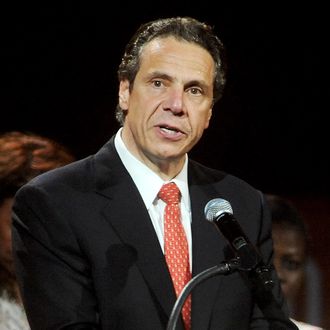
A year ago, Governor Andrew Cuomo announced with much fanfare that he was forming an investigatory panel, known as the Moreland Commission, to address reports of rampant corruption in Albany. Cuomo declared that the commission would be “totally independent,” and could even investigate his administration. “Anything they want to look at, they can look at — me, the lieutenant governor, the attorney general, the comptroller, any senator, any assemblyman,” he said. The reality was very different. Cuomo abruptly shut down the commission in March, prompting Manhattan’s U.S. attorney to take up its unfinished investigations into criminal activity in the state legislature, as well as accusations that Cuomo meddled with the commission’s probe. Now the New York Times is giving prosecutors a hand. During a three-month investigation, the paper found extensive evidence of how Cuomo’s office successfully objected anytime the commission focused on the governor or his associates.
The panel was plagued by infighting, and members of the commission came to believe that Regina Calcaterra, the panel’s executive director, was reading their emails and constantly updating Lawrence Schwartz, Cuomo’s top aide, on their plans. The most egregious example of Cuomo’s interference took place in September 2013, when the panel subpoenaed the media-buying firm Buying Time, which had been paid more than $4 million by the New York State Democratic party. The panel was unaware that Cuomo was one of Buying Time’s top clients. Shortly after the subpoena was issued, Schwartz called one of the commission’s three co-chairs and directed her to “pull it back.” The subpoena was quickly withdrawn.
Later the commission’s three co-chairs asked for a meeting with Cuomo to discuss their concerns that it had lost its way. When they complained about outside interference, Schwartz said the governor’s office was just trying to help them navigate Albany politics. “Things can be twisted against the governor by the Legislature,” he said, according to an unnamed participant. “You are looking at places where there may be no wrongdoing, but people will twist it to make it look like there was.”
He also reminded them that the Moreland Commission was created to investigate the legislature, not the governor (which is not stated in the executive order). When the co-chairs met with Cuomo, he gave them suggestions on how they should go after the legislature. Schwartz said in a statement to the Times that he only offered the commission “advice on investigative or tactical decisions,” to improve its “effectiveness and fairness.”
While the governor repeatedly said in public that the commission was free to investigate even him, in a 13-page response to the Times, the governor’s office said that action would have been inappropriate. “A commission appointed by and staffed by the executive cannot investigate the executive,” the statement said. “It is a pure conflict of interest and would not pass the laugh test.”
As New York’s Chris Smith noted when the U.S. attorney subpoenaed the commission’s records, the law allows Cuomo to play a large role in the panel, “so Cuomo could have done things that look ugly while being perfectly legal.” Using an ostensibly independent panel to pressure lawmakers, then suddenly shutting it down when you’ve achieved your political goals, could still cause problems for a politician who’s up for reelection in the fall.






























